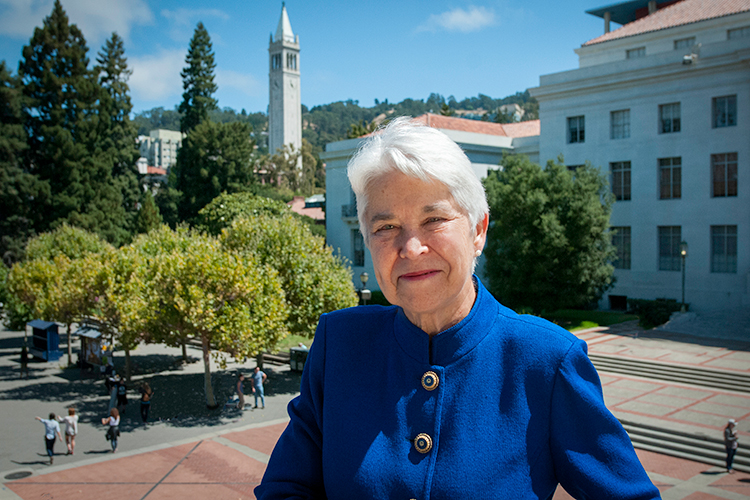Chancellor Christ announces new partnerships for People’s Park
"This project allows us to meet our responsibilities in a manner consistent with our mission and our values," Christ said in a statement sent Wednesday.

March 9, 2022
I am writing today to share word of a new, unprecedented partnership between our university, the City of Berkeley and local nonprofit organizations, a collaborative effort that will enable us to offer housing and a new daytime drop-in center to the unhoused members of our community who are currently living in and gathering at People’s Park.
Last fall, we promised that construction of urgently needed student housing, as well as new permanent supportive housing for formerly unhoused and very low-income people, would not begin at the site unless and until we could meet these essential needs of those currently in the park. This new alliance will enable us to make good on that commitment, and to proceed with our plans for a new People’s Park in a way that will benefit unhoused community members, students, and residents of and visitors to our city.
Transitional housing for the unhoused in People’s Park
Later today, I will join Mayor Jesse Arreguín, council member Rigel Robinson, and leaders of participating community organizations, at a press conference about this historic collaboration between a university and a city in support of unhoused community members. At the center of that collaboration is an 18-month lease agreement with the Rodeway Inn in Berkeley for 42 rooms that will house those currently living in People’s Park. At this motel, which has been converted for this purpose, each resident will be provided with a remodeled private room; a kitchenette and bathroom; clean linens and essential toiletries; regular housekeeping service; and access to laundry facilities. In addition, a local, highly experienced nonprofit Abode Services, will offer residents daily meal service; access to clinical health care and counseling; transportation support; and housing “navigators” who will assist the Rodeway Inn residents with their transition to permanent housing solutions.
Utilizing a $4.7 million grant from the state of California’s Encampment Resolution Fund, the City of Berkeley will assume responsibility for the cost of leasing the Rodeway Inn for 12 months and for the services provided by Abode during this same period of time. The university has committed approximately $2 million to cover expenses during the remaining six months of the lease.
For more details, please see our press release, and this NewsCenter story.
Daytime gathering place and essential services
Additionally, the university, City and First Presbyterian Church of Berkeley are working together to construct and fund the operations of a new daytime drop-in center on the church’s grounds, where services and support will be provided for community members in need.
To serve unhoused community members who currently use People’s Park and the Telegraph neighborhood during the day, the Governing Session of the First Presbyterian Church of Berkeley unanimously approved the proposal to establish the Sacred Rest Drop-In Center on its property. Renderings of the facility, designed by Berkeley professor Sam Davis, are available on the People’s Park Project website.
In order to ensure those who use the drop-in center will be well supported, the university has awarded a two-year $500,000 grant, and the City will provide an additional $250,000 to another, experienced local non-profit, The Village of Love, for the provision of services at the center. Those services will include meals, mental health counseling, document preparation, housing navigation, shelter referrals, benefits access, and more. Here, too, a powerful coalition of community organizations and city offices will be joining forces to provide additional services to those in need.
UC Berkeley’s homeless outreach coordinator and city staff who serve unhoused community members will complement the work of the Village of Love, and the Telegraph Business Improvement District’s (TBID) street ambassadors will provide support to Drop-In Center staff and management.
The idea for the Daytime Drop-In Center emerged from the findings of a university-commissioned study undertaken by researchers at UC Berkeley’s Goldman School of Public Policy, who worked in concert with unhoused community members at People’s Park. A great many of those interviewed noted the need for a safe place to rest and connect with services during the day.
The vision for People’s Park
Construction of urgently needed, below-market student housing for more than 1,100 students on the People’s Park site is scheduled to begin during the summer of 2022. The People’s Park project also includes the construction of 100 units of permanent supportive housing for formerly unhoused and low-income community members, a project element that will be developed and operated by the local non-profit developer Resources for Community Development (RCD). The project will preserve 60 percent of the park’s ground as revitalized open space, which will include a commemoration of the park’s important history and legacy. Additional information about the project can be found here.
As you may know, last fall the campus conducted a scientific, random-sample survey of all students, seeking information about their perspectives regarding this project. While we were pleased to learn that 64% of students support the People’s Park project, we acknowledge and respect the fact that reservations remain. We hope news of these agreements will help to alleviate concerns, and in the weeks ahead we will work to provide students and other members of the campus community with opportunities to learn more about the details, as well as the opportunities for student participation in the programs described above.
I am so grateful to the many campus colleagues who have worked so hard in recent months on these agreements which will allow us to extend and expand our long legacy of supporting and assisting unhoused members of our community.
Building new, below-market housing for our students remains a priority for our university. And, as members of the city and regional communities, we have a role to play in addressing the crisis of homelessness. This project allows us to meet our responsibilities in a manner consistent with our mission and our values.